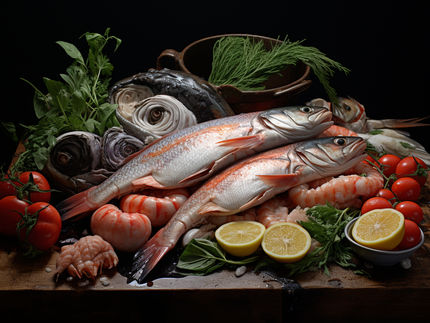Eating fish is practicing climate protection
Sustainable fish consumption helps the climate and protects the oceans
Advertisement
"fish plays a key role when it comes to environmentally conscious nutrition and climate protection," says Dr. Stefan Meyer, Managing Director of the Fisch-Informationszentrum e.V. (FIZ) in Hamburg. The marine biologist refers to various studies and the latest report from the Food and Agriculture Organization of the United Nations (FAO). By eating fish, German consumers can significantly reduce their carbon footprint and protect the oceans at the same time. This is because the range of sustainably caught or farmed fish on the German market offers a climate-friendly and healthy alternative to meat, the production of which causes significantly higher greenhouse gas emissions.
A widespread misconception is that our oceans are 90 percent overfished. This figure is based on a misinterpretation of a report by the Food and Agriculture Organization (FAO), which has been examining the state of the 445 most important fish stocks every year since the 1970s. The fact is that when assessing fish stocks, a distinction is made between so-called under-exploited (12 percent), maximum sustainable exploitation (50 percent) and over-exploited (38 percent) stocks. Consequently, the correct answer to the question of how many fish stocks in the world are used sustainably is: 62 percent. If you take a closer look at the supply in Germany, the statistics look even better. According to estimates, the proportion of sustainable marine fish on the German market is well over 80 percent.
Aquaculture: a growing contribution to a sustainable fish supply
What many people don't know: The fish or even crabs, molluscs and co. on our plates today no longer only come from wild stocks, but more than half of them come from fish farming - so-called aquaculture. Up to 90 percent of the salmon and shrimp popular in Germany are farmed in this way. This relieves the pressure on global fish stocks, as no marine fish is used for the majority of aquaculture. Aquacultures also score above average in other sustainability categories. They can be operated with climate-friendly energy and use small amounts of drinking water and land. All of this contributes to a significant reduction in the ecological footprint.
What does fish consumption have to do with climate protection?
Every form of food production causes climate-damaging emissions. Everyone can make a contribution to reducing these emissions through their own eating habits. This is one of the reasons why the German Nutrition Society (DGE) recommends reducing meat consumption and eating more plant-based food instead. However, what is often forgotten is that fish and seafood also have a very good carbon footprint. According to a study by the ifeu - Institute for Energy and Environmental Research in Heidelberg - catching and processing 1 kilogram of herring in the North Sea, for example, causes less than 1 kilogram of CO2 emissions. By comparison, the figure for chicken meat is 5.5 kilograms of CO2 and for beef as much as 13.6 kilograms of CO2. Herring performs so well because fishing is very energy-efficient. The same applies to other marine fisheries and aquacultures, which average between 2 and 5 kilograms of CO2 per kilogram of food.
In a nutshell: five reasons why you should eat fish more often instead of meat:
- Fish stocks are doing better than expected: an estimated eight out of ten marine fish on the German market today are already caught sustainably. This figure can only increase if Germany continues to buy sustainable fish.
- Less CO2 emissions: Fish, especially from sustainable fishing and aquaculture, produces significantly less CO2 than animal protein produced on land. Fun fact: Only protein from insects can keep up with fish and co. in terms of CO2 footprint.
- Healthy nutrient density: Fish and seafood provide a high content of essential nutrients such as high-quality protein, iodine and omega-3 fatty acids. You need significantly larger quantities of other foods to absorb the same valuable ingredients. This can also lead to a larger ecological footprint.
- Reduce meat consumption: If you decide to replace a portion of meat with fish once or twice a week, you can significantly reduce your carbon footprint without having to change your entire diet.
- Shop sustainably: Sustainable fish products are often labeled with a seal in Germany. This makes it easier to choose and there is a wide variety on offer. So you can find a sustainable product for every taste.
Note: This article has been translated using a computer system without human intervention. LUMITOS offers these automatic translations to present a wider range of current news. Since this article has been translated with automatic translation, it is possible that it contains errors in vocabulary, syntax or grammar. The original article in German can be found here.































































